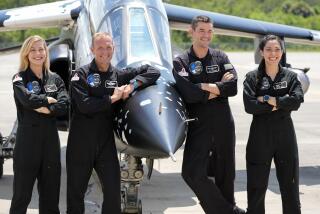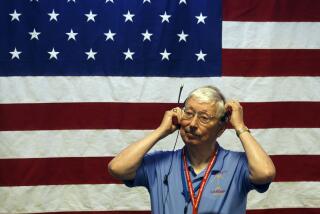PASSINGS: Loren Miller Jr., Boris Chertok
Loren Miller Jr.
Longtime Superior Court judge
Retired Superior Court Judge Loren Miller Jr., 74, the second of three generations of his family to serve on the bench in California, died Dec. 5 of complications from chronic obstructive pulmonary disease at Kaiser Permanente West Los Angeles Medical Center, his family said.
Miller was appointed to the Los Angeles Municipal Court by Gov. Jerry Brown in 1975 and elevated to the Superior Court in 1977. Until his retirement in 1997, he handled a number of assignments, including supervising judge in Pomona. He continued to be assigned to cases until two months ago.
His father, Loren Sr., was a prominent civil rights attorney who argued against restrictive covenants before the United States Supreme Court in the 1940s and ‘50s and served on the Municipal Court from 1964 to 1967. Miller’s daughter, Robin Miller Sloan, was named to the Superior Court in 2003.
Miller was born in Los Angeles on March 7, 1937. After graduating from Belmont High School and attending Los Angeles City College, he earned a bachelor’s degree in history from the University of Oregon in 1960. He completed law school at Loyola University in 1962.
For the next six years he was a deputy attorney general specializing in civil rights and tax cases. He later worked as director of litigation at the Western Center on Law and Poverty and practiced privately before becoming a senior attorney for Pacific Lighting Corp. in 1972.
Boris Chertok
He helped put first man in space
Boris Chertok, 99, a Russian rocket designer who played a key role in engineering Soviet-era space programs, died Wednesday in Moscow after contracting pneumonia, according to the state-controlled RKK Energiya rocket builder where he worked as a top consultant.
For many years, Chertok served as a deputy to the father of the Soviet space program, Sergei Korolyov. He was closely involved in putting the world’s first satellite in orbit on Oct. 4, 1957, and preparing the first human flight to space by Yuri Gagarin on April 12, 1961.
Chertok was born in 1912 in Lodz, Poland, when it was still part of the Russian empire, and his family moved to Moscow at the start of World War I.
After graduating from the Moscow Energy Institute in 1940, he started working as an aviation engineer. When World War II ended, Chertok was selected to lead a group of Soviet experts to travel to Germany to tap the Nazi know-how in rockets. He first met Korolyov there, and the two worked closely until Korolyov’s death in 1966.
Chertok, who specialized in control systems for rockets and spacecraft, has published memoirs in the last few years chronicling the rise of the Soviet space program from its early days to the moon race that the Soviet Union lost to the United States.
“Each of these first rockets was like a beloved woman for us,” Chertok recalled. “We were in love with every rocket, we desperately wanted it to blast off successfully. We would give our hearts and souls to see it flying.”
Chertok’s voluminous work for the first time revealed to the public details of the endeavors that had been hidden by the veil of Soviet-era secrecy.
Los Angeles Times staff and wire reports
More to Read
Start your day right
Sign up for Essential California for the L.A. Times biggest news, features and recommendations in your inbox six days a week.
You may occasionally receive promotional content from the Los Angeles Times.




















































